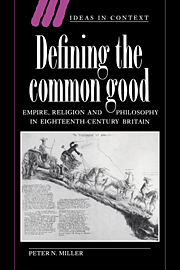Book contents
3 - State and empire
Published online by Cambridge University Press: 23 October 2009
Summary
The ‘year one’, as computed by most eighteenth–century British political writers, was 1688. At the various centenary celebrations, the era commencing with the Revolution of 1688 was declared ‘glorious'. The ‘settlement’ of outstanding constitutional anomalies had made possible the political consolidation of the British state on the island that had since been united and the simultaneous extension of that state's power across the globe. Politics and empire were obverse and reverse of the formation of this territorial state. Despite general agreement on the purpose of political life, the precise nature of the service of this common good was, as we have observed, a matter of some disagreement. Suspicion of government and a hankering after an ill–defined liberty turned some eighteenth–century opposition writers into enemies of what they perceived to be its debased modern, British version. Parliamentary supremacy had been achieved by corrupting government and population with the wealth drawn from Britain's overseas commerce. Those, however, whose view of politics could be summed up by the word ‘prudence’ eschewed the politics of moral reformation. They advocated listening to the dictates of necessity; only by securing the well–being of the political community could government earn its legitimacy. Trade, rather than corrupting the nation, strengthened it. The establishment and encouragement of colonies, especially in North America, were components of this political strategy. If the practice of colonization in the seventeenth century occurred under the banner of the reason of state, its eighteenth–century theory reflected the more refined logic of the science of politics. Revolution, union, war and expansion.
- Type
- Chapter
- Information
- Defining the Common GoodEmpire, Religion and Philosophy in Eighteenth-Century Britain, pp. 150 - 213Publisher: Cambridge University PressPrint publication year: 1994



